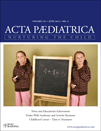The nonimpact of gestational age on neurodevelopmental outcome for ventilated survivors born at 23–28 weeks of gestation
Abstract
Aim: It has long been known that survival of preterm infants strongly depends upon birth weight and gestational age. This study addresses a different question – whether the gestational maturity improves neurodevelopmental outcomes for ventilated infants born at 23–28 weeks who survive to neonatal intensive care unit (NICU) discharge.
Methods: We performed a prospective cohort study of 199 ventilated infants born between 23 and 28 weeks of gestation. Neurodevelopmental impairment was determined using the Bayley Scales of Infant Development-II at 24 months.
Results: As expected, when considered as a ratio of all births, both survival and survival without neurodevelopmental impairment were strongly dependent on gestational age. However, the percentage of surviving infants who displayed neurodevelopmental impairment did not vary with gestational age for any level of neurodevelopmental impairment (MDI or PDI <50, <60, <70). Moreover, as a higher percentage of ventilated infants survived to NICU discharge at higher gestational ages, but the percentage of neurodevelopmental impairment in NICU survivors was unaffected by gestational age, the percentage of all ventilated births who survived with neurodevelopmental impairment rose – not fell – with increasing gestation age.
Conclusion: For physicians, parents and policy-makers whose primary concern is the presence of neurodevelopmental impairment in infants who survive the NICU, reliance on gestational age appears to be misplaced.




